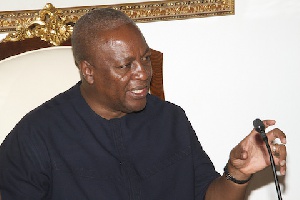ECOWAS Chair John Mahama says the sub-Region must review its strategy in fighting the Ebola Virus Disease, so as not to isolate affected countries.
The Ghanaian President told a conference of West African health Ministers in Ghana’s national capital, Accra, Thursday that: "We must implement containment measures but we must not implement measures that isolate and ostracise the affected countries”.
Prior to the Conference, Mahama had warned that adhoc and isolationist measures being adopted by some African countries in fighting the haemorrhagic disease could be counterproductive.
He expressed worry about the ban on flights to and from some countries, as well as the restriction of movement within certain countries, which he feared could frustrate voluntary efforts to help curb the disease.
The disease has taken a toll on Liberia, Guinea, Sierra Leone and lately Nigeria. It has killed more than 1,400 people in the sub-Region. D R Congo is the latest to have confirmed a case.
John Mahama told the conference in Accra that whatever strategies are adopted by the region to combat the disease must ensure that the affected countries are not treated as outcasts.
“Excessive restriction of travel and border closure will adversely affect the economies of affected countries”, Mahama stressed.
“An African proverb says when your neighbour's house is on fire you must go and help him to quench it because, after it has consumed his house it will spread to yours”, he said to emphasise the need for concerted efforts in tackling the disease.
Ebola is contracted through direct contact with affected people and animals: apes, antelopes and fruit-eating bats.
It kills within 21 days with a death rate of between 50 and 90 percent.
The disease has no cure. But an experimental drug, zMapp, has been cleared by the World Health Organization for use on patients.
Two American aid workers who contracted the disease in Liberia have recovered after the serum was administered to them.
General News of Thursday, 28 August 2014
Source: starrfmonline.com

















